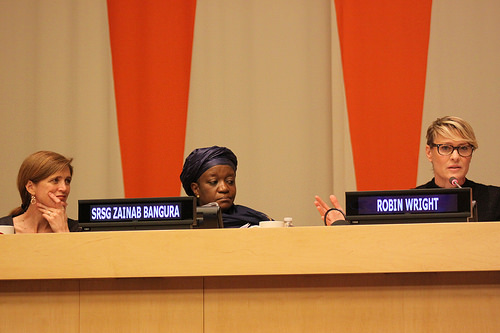
This post was written by guest-blogger Natalie Schreffler.
In celebration of International Women’s Day 2014, the Enough Project organized and co-hosted an event last Thursday with the United Nations Office of the Special Representative on Sexual Violence in Conflict entitled “Elevating the Conversation on Ending Sexual Violence in Conflict.” The event aimed to draw attention to the worldwide crisis of sexual violence in conflict, generate policy discussion on solutions through a multi-stakeholder dialogue, and emphasize Enough’s commitment to helping address sexual violence in Congo. The high-level panel was moderated by Enough Project Co-Founder John Prendergast and included U.S. Ambassador to the United Nations Samantha Power, United Nations Special Representative on Sexual Violence in Conflict Zainab Bangura, Congolese lawyer Sylvia Maunga, actor and activist Robin Wright, and Director of Corporate Responsibility at Advanced Micro Devices (AMD) Tim Mohin. Enough Policy Associate Holly Dranginis gave an overview of the current status of sexual violence in conflict, and panelists discussed progress made, gaps in combatting the problem, and the challenges that still lie ahead.
“We are crushing it on the normative front,” remarked Ambassador Samantha Power, “and normative progress is necessary but is not sufficient.”
Special Representative Zainab Bangura stated that “we have broken the backbone of sexual violence,” and we must now continue to put pressure on leaders in conflict-ridden zones to ensure that sexual violence continues to decrease. Sylvie Maunga stressed the importance of accountability for perpetrators of sexual violence, and Tim Mohin described the important role of the electronics sector in building a clean minerals trade in Congo that does not fund armed groups. In line with Intel’s recent announcement that its microprocessors will now be conflict-free, Mohin is working through his company, AMD, and the Electronic Industry Citizenship Coalition to harness the power of business to increase security and encourage investment in Congo’s minerals sector. With humble passion, Robin Wright discussed her experience of going to the Democratic Republic of Congo (DRC) and the fact that each of us have a part in the violence that happens there because of our use of conflict minerals. These minerals–tin, tungsten, tantalum, and gold–are used in cell phones, laptops, jewelry and other consumer products, and directly contribute to the violent conflict in the region. Rape and other forms of sexual and gender-based violence are widespread in Congo, used by the army and rebel militias as a weapon to instill fear and establish control. Congolese lawyer and activist Sylvie Maunga underlined the importance of accountability for perpetrators of the violence, and called on the international community to support Congo in setting up a mixed court to prosecute high-level offenders of sexual violence and other serious war crimes. Robin Wright urged students and activists to continue to make noise about this issue, as continued pressure needs to be put on the DRC and regional governments in order for a peace process to be formed and take root. The panelists’ comments about sexual violence, and Congo in particular, were cautiously hopeful, despite the work that remains to be done.
Panel discussion at the United Nations
Taking place right before International Women’s Day, the event highlighted the importance of women’s empowerment in any country’s national security. In the recent ICC ruling on Congolese militia leader Germain Katanga, the Chamber found him guilty of four war crimes (murder, attacking a civilian population, destruction of property and pillaging) but acquitted him of the charges of mass rape and sexual slavery, highlighting the need for improved approaches to investigating and prosecuting sexual violence at the ICC and elsewhere. The panelists, especially Ambassador Power, Sylvie Maunga, and Special Representative Bangura conclusively agreed that better accountability and attention to the needs of survivor communities are the next urgent steps the international community should take if we are to see progress.
The event was preceded by a campaign initiated by Raise Hope for Congo, in which over 1,000 students and activists around the world participated in raising awareness for the creation of a sustainable peace process in Congo by writing creative slogans and submitting photos to social media channels. The photos were compiled into a book and presented to the panelists at the event in an attempt to inspire and encourage the panelists, the government, and the private sector to continue taking action for peace in Congo.
Follow the conversation spurred by the event with the hashtag #elevatepeace.
Check out photos from the event on the End Rape in War Flickr page.
Related Stories:
- Ending Sexual Violence Behind the 'Cellphone War'
- Political Momentum on Sexual Violence 'Unprecendented,' UN Advisor Says
Photo: Ambassador Samantha Power, SRSG Zainab Bangura, and Robin Wright at the United Nations

